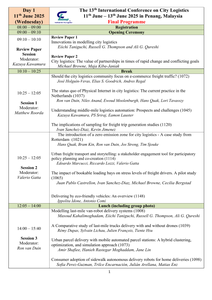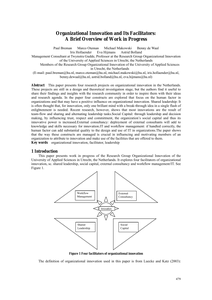Summary Project objectives This study fits into a larger research project on logistics collaboration and outsourcing decisions. The final objective of this larger project is to analyze the logistics collaboration decision in more detail to identify thresholds in these decisions. To reach the overall objectives, the first step is to get a clearer picture on the chemical and logistics service providers industry, sectors of our study, and on logistics collaboration in these sectors. The results of this first phase are presented in this report. Project Approach The study consists of two parts: literature review and five case studies within the chemical industry. The literature covers three topics: logistics collaboration, logistics outsourcing and purchasing of logistics services. The five case studies are used to refine the theoretical findings of the literature review. Conclusions Main observations during the case studies can be summarized as follows: Most analyzed collaborative relationships between shippers and logistics service providers in the chemical industry are still focused on operational execution of logistics activities with a short term horizon. Supply management design and control are often retained by the shippers. Despite the time and cost intensive character of a logistics service buying process, shippers tendering on a very regular basis. The decision to start a new tender project should more often be based on an integral approach that includes all tender related costs. A lower frequency of tendering could create more stability in supply chains. Beside, it will give both, shippers and LSPs, the possibility to improve the quality of the remaining projects. Price is still a dominating decision criterion in selecting a LSP. This is not an issue as long as the comparison of costs is based on an integral approach, and when shippers balance the cost criterion within their total set of criteria for sourcing logistics services. At the shippers' side there is an increased awareness of the need of more solid collaboration with logistics service providers. Nevertheless, in many cases this increased awareness does not actually result in the required actions to establish more intensive collaboration. Over the last years the logistics service providers industry was characterized by low profit margins, strong fragmentation and price competition. Nowadays, the market for LSPs is changing, because of an increasing demand for logistics services. To benefit from this situation a more pro-active role of the service providers is required in building stronger relationships with their customers. They should pay more attention on mid and long term possibilities in a collaborative relation, in stead of only be focused on running the daily operation.
DOCUMENT

from the article: "Abstract The way in which construction logistics is organised has considerable impact on production flow, transportation efficiency, greenhouse gas emissions and congestion, particularly in urban areas such as city centres. In cities such as London and Amsterdam municipalities have issued new legislation and stricter conditions for vehicles to be able to access cities and city centres in particular. Considerate clients, public as well private, have started developing tender policies to encourage contractors to reduce the environmental impact of construction projects. This paper reports on an ongoing research project applying and assessing developments in the field of construction logistics in the Netherlands. The cases include contractors and third party logistics providers applying consolidation centres and dedicated software solutions to increase transportation efficiency. The case show various results of JIT logistics management applied to urban construction projects leading to higher transportation efficiencies, and reduced environmental impact and increased production efficiency on site. The data collections included to-site en on-site observations, measurement and interviews. The research has shown considerable reductions of vehicles to deliver goods and to transport workers to site. In addition the research has shown increased production flow and less waste such as inventory, waiting and unnecessary motion on site."
DOCUMENT

With the approach of the zero emission zone implementation in 30-40 cities mandated by the Dutch Klimaatakkord, comes the need to determine whether the SMEs located within these zones are aware of the coming changes and if they are, how far they have come in their preparation. This paper delves into the development of the zero emission city logistics maturity model tool which is used to indicate the progress of these small to medium enterprises in light of reaching fully zero emission city logistics operations. The paper starts off with a review of existing maturity models which forms the baseline for the zero emission city logistics maturity model in rubric form. A QuickScan analysis is developed in order to facilitate data collection by students who then approach businesses and use the QuickScan results to benchmark the businesses progress against other businesses. This paper then concludes with the preliminary results from the initial QuickScans performed by HBO level students.
DOCUMENT

Municipalities play an important role in tackling city logistics related matters, having many instruments at hand. However, it is not self-evident that all municipalities use these instruments to their full potential. A method to measure city logistics performance of municipalities can help in creating awareness and guidance, to ultimately lead to a more sustainable environment for inhabitants and businesses. Subsequently, this research is focused on a maturity model as a tool to assess the maturity level of a municipality for its performance related city logistics process management. Various criteria for measuring city logistics performance are studied and based on that the model is populated through three focus fields (Technical, Social and Corporate, and Policy), branching out into six areas of development: Information and communication technology, urban logistics planning, Stakeholder communication, Public Private Partnerships, Subsidisation and incentivisation, and Regulations. The CL3M model was tested for three municipalities, namely, municipality of Utrecht, Den Bosch and Groningen. Through these maturity assessments it became evident the model required specificity complementary to the existing assessment interview, and thus a SWOT analysis should be added as a conclusion during the maturity assessment.
DOCUMENT

Environmental concerns and urbanization pressures are driving demand for more efficient reverse logistics in city environments, where space constraints and dense populations create unique challenges. Polyurethanes (PU), used widely in insulation, electronics, and automotive industries, are integral to circular supply chain discussions due to their low recycling rates. This study emphasizes the challenges of urban reverse logistics for the disposal and collection of refrigerators in countries with different waste management systems. In the paper qualitative and quantitative methods have been applied. Based on the research carried out, it was shown how complex the reverse logistics process is in the city concerning waste such as fridges. It is influenced by, among other things, regulations at EU and national level, cooperation between stakeholders, consumer awareness and education, and real-time access to information on waste.
DOCUMENT

The field of city logistics can be characterized by its many local demonstrations and trials, that are quite often not lasting longer than the trial period. The number of demonstrations that continued and were implemented in daily practice is limited. Freight partnerships proved to be a good first step to engage stakeholders. This contribution proposes a new way to develop a more action-driven form of these partnerships that follows from a solution approach, which has proved successful worldwide in fostering innovation deployment, but has not yet been applied explicitly in the domain of City Logistics: Living Labs. The living lab approach ensures that the stakeholders are involved much earlier in the in planning and implementation processes, and that the proposed city logistics implementation is revised and continuously improved to meet stakeholder needs and obtain maximum impact for a long time. This contribution summarizes the steps that have to be taken to set-up and work in a city logistics living lab (CLLL). A CLLL can be defined as a dynamic test environment where complex city logistics innovations can be implemented, following a cyclical approach, where several solutions can be experimented and re-adjusted or improved to fit the real-life city challenges. In the Horizon 2020 project CITYLAB, we developed practical guidelines for establishing and running a city logistics living lab based on several living lab- and field test methodologies that enables stakeholders to set-up and run a CLLL. This contribution discusses the most important CLLL phases, roles, and characteristics, as well as the tools that are available. Next, this contribution shows the first results of cities in which CLLLs are actually set up, or already running. © 2016 The Authors.
MULTIFILE
Western-European consumers have become not only more demanding on product availability in retail outlets but also on other food attributes such as quality, integrity, and safety. When (re)designing food supply-chain networks, from a logistics point of view, one has to consider these demands next to traditional efficiency and responsiveness requirements. The concept ‘quality controlled logistics’ (QCL) hypothesizes that if product quality in each step of the supply chain can be predicted in advance, goods flows can be controlled in a pro-active manner and better chain designs can be established resulting in higher product availability, constant quality, and less product losses. The paper discusses opportunities of using real-time product quality information for improvement of the design and management of ‘AgriFood Supply Chain Networks’, and presents a preliminary diagnostic instrument for assessment of ‘critical quality’ and ‘logistics control’ points in the supply chain network. Results of a tomato-chain case illustrate the added value of the QCL concept for identifying improvement opportunities in the supply chain as to increase both product availability and quality. Future research aims for the further development of the diagnostic instrument and the quantification of costs and benefits of QCL scenarios.
DOCUMENT

We review the current body of academic literature concerning gamification of production and logistics. The findings indicate that production execution and control has been addressed most often in the current body of literature, which consists mostly of design research. Objectives and goals, points, achievements, multimedial feedback, metaphorical/fictional representations, and levels and progress are currently most often employed gamification affordances on this field. The research has focused on examining or considering motivation, enjoyment and flow as the main psychological outcomes of gamification in the given context, while individual performance and efficiency are the most commonly examined or suggested behavioral/organizational impacts. Future studies should employ more rigorous study designs and firmly ground the discussions in organization theory.
LINK
This paper presents four research projects on organizational innovation in the Netherlands. These projects are still in a design and theoretical investigation stage, but the authors find it useful to share their findings and insights with the research community in order to inspire them with their ideas and research agenda. In the paper four constructs are explored that focus on the human factor in organizations and that may have a positive influence on organizational innovation. Shared leadership: It is often thought that, for innovation, only one brilliant mind with a break-through idea in a single flash of enlightenment is needed. Recent research, however, shows that most innovations are the result of team-flow and sharing and alternating leadership tasks. Social Capital: through leadership and decision making, by influencing trust, respect and commitment, the organizations social capital and thus its innovative power is increased. External consultancy: deployment of external consultants will add to knowledge and skills necessary for innovation. IT and workflow management: if handled correctly, the human factor can add substantial quality to the design and use of IT in organizations. The paper shows that the way these constructs are managed is crucial in influencing and motivating members of an organization to attribute to innovation and make use of the facilities that are offered to them.
DOCUMENT
